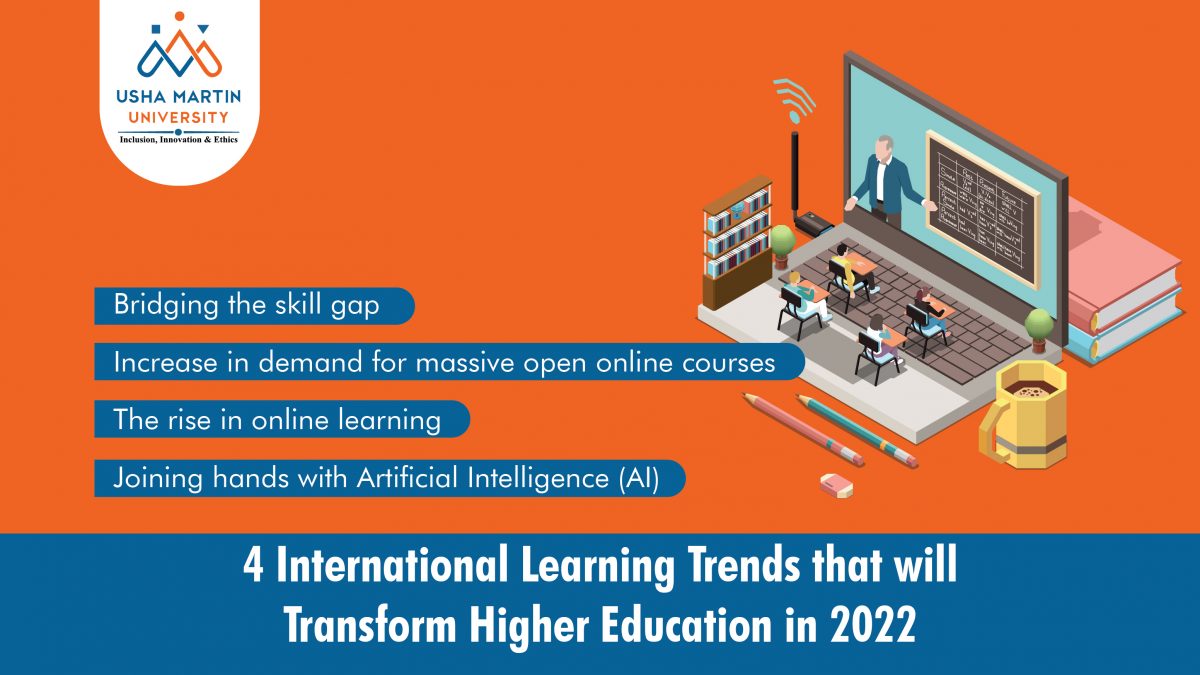
Significance of Studying B.A (Hons.) English Literature in the Modern Society
April 4, 2022
Top 4 Reasons do MBA in Finance Opens Up Avenues of Splendid Career
April 7, 2022Since the COVID-19 pandemic began, the education industry has had to adjust priorities and focus on the convenience and well-being of students. Over the last two years, most schools and universities have turned to online learning platforms to keep academic activities alive. Virtual learning has widened the skill gap even further, necessitating a greater grasp of the trends that will shape future job patterns. Although schools and colleges adopted online learning throughout the pandemic, the World Economic Forum claims that this simply gives the illusion of higher education change. However, by combining online resources to enhance the learning experience, the online learning strategy is reinventing traditional learning. However, this is not the only trend affecting higher education. Higher education is undergoing several significant changes.
And, if you’re looking for the top university in Ranchi to pursue higher education, Usha Martin University is the ideal option in 2024. The university will not only provide you with in-depth knowledge of the professional courses you have enrolled in but will also focus on your overall grooming, to transform you into a confident professional ready to thrive in a world of opportunity.
4 International learning trends that will shape higher education in 2024:
- Joining hands with Artificial Intelligence (AI)
- The rise in online learning
- Increase in demand for massive open online courses
- Bridging the skill gap
1. Joining hands with Artificial Intelligence (AI)
Today’s technological advancements have aided in bringing out the creative and curious part of the human intellect. One such instrument that helps in the creation of a customized study program for each student is artificial intelligence (AI). By spreading material in little pieces that can be modified to match the requirements of individual students, it fills in the gaps left by traditional learning. And, because the data is generated by AI, all of the stuff provided is always up to date! AI is already being used successfully in various educational instances to improve learning and student growth, as well as the performance of educators.
2. The rise in online learning
Since the year 2020, the word “online learning” has become the most commonly used term in the education industry worldwide. The education pattern has changed considerably as a result of the pandemic, with the rise of e-learning, in which teaching is done remotely and on digital platforms. Online learning is a type of digital learning that takes place outside of traditional classroom settings. Students who learn online are not constrained by time, distance, or location. This gives students the freedom to study whenever and however they want. This way of learning has been adopted by the vast majority of students. According to a report, the overall market for online education is expected to reach $350 billion by 2025.
3. Increase in demand for massive open online courses
The global massive open online course (MOOC) market was valued at USD 6845.4 million in 2020, and it is predicted to grow at a CAGR of 18.13 percent from 2021 to 2026, to reach USD 18925.18 million. MOOCs (Massive Open Online Courses) are free, short-duration courses that may be accessed from anywhere at any time and are designed for the general public. These courses are an excellent approach for students to improve their skills. Apart from the short-duration sessions, it allows students to learn more in less time, this is one of the key advantages of these courses.
4. Bridging the skill gap
Students select higher education because it helps them develop their skills and broaden their horizons. As a result, many colleges provide internship opportunities for students to develop their profiles and satisfy market demands. Despite all of this effort, the skill gap continues, and institutions are collaborating with corporations to bridge it. They are developing Corporate Partnership Programs to help in the development of a long-term commitment to the business community. The persistent economic crisis brought on by the pandemic has expanded the talent gap, necessitating urgent human and digital skill upgrades. Thus, it will be critical for institutions to assist students in upgrading their skills, becoming market-ready, and leapfrogging the competition.
Conclusion
To sum up, the days when a bachelor’s degree was enough to land a student their dream job are long gone. Tectonic transformations in the higher education landscape and hiring market have occurred for a variety of causes. Students require more than a degree to stand out from the crowd. They must possess marketable skills. In 2024, the above-mentioned learning trends will transform higher education. Learning will become more accessible to everyone because of new technologies like AI and AR/VR. Although these tools and technology are convenient, in developing nations where conventional learning is more economical, bringing about this transformation may be difficult. Institutions will need to devise measures to make these facilities available to all, regardless of their socioeconomic status.





